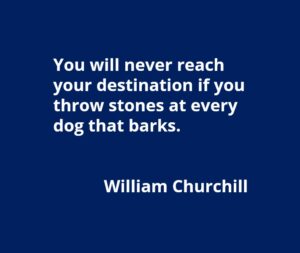There’s an old phrase from Winston Churchill that perfectly sums up for me how negativity affects creativity.
You will never reach your destination if you throw stones at every dog that barks.
I can’t speak for you, but every now and then, I meet that one person who prefers to spend (waste?) their valuable time and energy to stop and criticise something or someone.
Personally, I don’t get it. Why stop and be negative?
It doesn’t matter what the destination is …
the goal of a project
the pursuit of a great idea
a continuation of the journey itself
… because you’ll likely not get there if you get distracted on the obstacles and lose focus on the end goal.
That’s what negativity does to creativity.
Not to sound like a Hallmark greeting card, but I believe creativity is the single aspect that allows all of us to create or do something new and different in our lives. Even more so, an act of creativity prevents us from falling into a mundane pattern and routine.
Its frailty is even more acute for business because creativity is as vital to corporate health and success as accounting, operations and manufacturing. Peter Drucker took it one step further, famously arguing that business has only two real functions: marketing and innovation. I’d take it another step.

Negativity robs an organisation of its most valuable asset: new and original thinking.
Surely we’d be violently agreeing that creativity and innovation are extremely important, and by extension, that brainstorms are important. At the same time, there’s universal agreement that negativity affects creativity in destructive ways. Whether it’s a formal brainstorm in a conference room or a spur-of-the-moment discussion over a desktop, negativity prevents us from productive thinking at work.
Why the contradiction between our belief and behaviour? What causes negativity? And most of all, what can we do about it?
Negativity is Many Emotions and Behaviours Together
Among them:
Pessimism
That won’t work
Adversity
Let me play devil’s advocate
Dismissal
We’ve already tried that
Disdain
That’s a stupid idea
Negativity can also be self-directed. We censure or criticize our own thoughts, using emotional and perceptual blocks to burden our creative thinking. This can be even more debilitating when the situation feels wrong.
- I’m not creative.
- I don’t feel creative today.
- I’m not as creative as him or her.
- I’m really uncomfortable when I have to be creative.
- I don’t like dealing with things that are abstract.
- This situation makes (or certain people make) me uncomfortable.
- I feel a great deal of pressure to create something on the spot.
When negativity moves from individual to group dynamics, the problem is compounded by an even larger range and depth of emotions, mostly fear, such as:
- I will lose face in front of my peers.
- People will think my ideas are dumb or bad.
- I hate speaking aloud in front of others.
- I hate making public mistakes.
- I fear taking risks which might jeopardize (my job, my reputation).
- I fear exposing my weaknesses in front of others.
- I dislike creating ideas in front of other people, as if everyone is staring at me.
Other emotions are based on insecurity or chaos.
- I hate ambiguity.
- I can only evaluate in terms of how much something will cost.
- I must be highly efficient at work because mistakes are costly and wrong.
Why else do you think we tolerate creativity in business situations? Feel free to add your thoughts and comments below.
Ideas To Help Minimise Negativity
If you’re the brainstorm participant, here are some suggestions to minimise how negativity affects your team’s creativity.
- Talk to the facilitator beforehand.
- Try to get as much information as possible so you can give it due thought.
- Learn when and how you are more comfortable taking risks. Some people like to read something in advance, or talk to trusted people in advance.
- Be assertive about what you need.
- Respect your discomfort. And, don’t judge yourself.
- Embrace – if not articulate – the discomfort. What would help?
- It’s very possible others feel the same way as you. Look for positive people to pair with for meetings.
- Balance your emotions. Like the Looney Tunes cartoons with a Devil on one shoulder and an Angel on the other, sometimes you need to tell the Devil to shut up and listen to the Angel instead.
Or, if you’re the brainstorm facilitator (), here are some parallel suggestions:
- Take extra care by knowing the people in your brainstorm. Invites should not be random.
- Ask if there’s anything you can do to help or prepare them for the social engagement of brainstorming.
- Make everyone welcome at the beginning.
- There’s nothing wrong with letting people be creative in their own way (solo brainstorming, or pairing people off in pairs to limit ‘exposure’) or at their own tempo. Plenty of times people have approached me afterward with ideas.
- Keep the meeting light, if not fun and/or humorous. Invite discussion.
- Accept constructive criticism.
Any other thoughts or suggestions on minimising the affects of negativity on creativity? Please add your comments below.
A Three-Part Series on how Negativity Affects Creativity
The topic of negativity is one that keeps cropping up in both brainstorms that I run for clients, as well as in conversations in my workshops and training.
There are three articles beyond the initial post: The Difference Between Negativity and Criticism in Brainstorming
How Negativity Affects Creativity (This Article)


No comment yet, add your voice below!